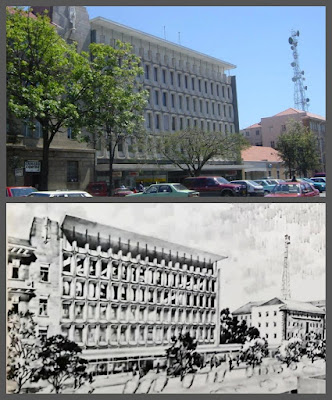These posts from LinkedIn deal with Zimbabwe architecture before independence, the UDI period, 1970s. I arrived about a year after independence, so although I got to know Frank Lincoln for example, I didn't really witness this period. As usual my comments are just ad-libbing on thoughts that come to mind as I reflect on the 23 years I spent living in this beautiful but troubled country.
I have forgotten where some of these
places are. At least, my memory is a bit scrambled. Vivid in parts and vague in
others. Looking through my database for the Kopje area, I found two interesting
buildings.
One was the headquarters of Harvey Bufe, designed long
before Vernon Mwamuka came along. The other is Zimbank West End, originally
Pallet & Price, extended by Frank Lincoln when he was still working under
the "Driver-Jowitt & Lincoln" brand. Frank loved his decorative
patterns, maybe because of his Mauritian background.
I have some scanned pages from old Architect &
Builder magazines that belonged to Mike Clinton. The April 1979 edition
featured Harvey Bufe's office building. Eventually I found this on Google
Earth.
It's barely visible behind the advertising hoardings,
but appropriately enough, Vernon's Kopje Plaza (Net One) is popping up in the
background.
I also have partially scanned drawings for Zimbank. We
were called in to propose some alterations I think. Dated as 1969, so a decade
earlier. The wonderful free form design of the precast panels is badly faded
and blurred on the drawing scans, but fortunately I have digital photos.
Fortunate because I think they have gone now.
Both these buildings should have been subject to
preservation orders in my opinion. I'm not against alterations but this is
significant heritage that could have been treated with more respect.
Just a little trip down memory lane.
Snapshots from a Bulawayo walkabout
with my newly acquired digital camera.
The ease with which sculpture was integrated into what
was essentially a modernist design is most impressive. Could anyone do that
with a straight face today.
And the Bauhaus clock. Very stylish although missing a
couple of the 5 minute markers. Time was in the public domain in those days, a
tradition that had been going along for several hundred years. What's the point
of a public clock today. Bit of an empty gesture.
Those missing markers are emblematic of the general
condition of the building. Sad really. I remember when we started to work in
Blantyre around 2000 being shocked at how run down the town centre was. I fear
that Zimbabwe is "catching up"
Nevertheless it's a strong enough design to maintain
its dignity. Photos from 2002 when I went down to NUST to teach a short module
on setting out to the architecture students.
That was a fun week. For me at least 🤣🤣🤣
Does anyone have more information on this building?004
More examples of bold and confident
precast from my 2002 drive down to Bulawayo for a week of guest teaching at
NUST.
The abstract /cubist pattern screen is from Beverly
Building Society. I don't know the architect but it's reminiscent of Frank
Lincoln's work to my eye. Compare his work for Zimbank in Harare in my previous
post.
The bulging rectangle motif is from Sagit House design
by W. E. Alexander and completed in 1973, the year that I left London and moved
back up to Yorkshire, giving up Architecture in disgust to be a bricklayer and
wannabe musician on the Sheffield pub scene, rubbing shoulders with bands as
diverse as Human League and Deff Leppard.
The pen and ink sketch is by Alex Jack from his book
"Bulawayo's Changing Skyline" I lost so many books. Some of them I
had partially digitised, but not this one. So it feels good to have hauled it
back to Dubai where I can digitise at my leisure and with much improved
technology.
Two buildings in Bulawayo from the
early 70s, the height of UDI and sanctions. Obviously the economy was holding
up fairly well despite the fighting in the rural areas. Ultimately it was
unsustainable as we now know.
If Smith hadn't been so pig-headed, could things have
been different. To me prospects seemed very rosy in the 1980s when I was
working in the education sector in Zimbabwe but I think I misjudged the pent up
resentment among senior ZanuPF figures which later translated to refusal to
hand over power.
I digress. Old Mutual Centre is by Balfour Chandler.
Pioneer house, by Harvey, Bufe and Partners. This is confident modern
architecture before the rot set in and the self-indulgences of Post-Modernism
came into vogue. You get the feeling that everyone is working with a common
language. It's not spectacular, but do we really want every new office
development to shout out its uniqueness?
Perhaps my naive optimism is showing through again but
wouldn't it be nice to rediscover the magic that cities once had where
buildings seemed to respect each other, to work within a tradition, reserving
the spectacular surprises for a few special moments?







No comments:
Post a Comment
I've been getting a lot of spam so had to tighten up comments permissions. Sorry for any inconvenience. I do like to hear from real people